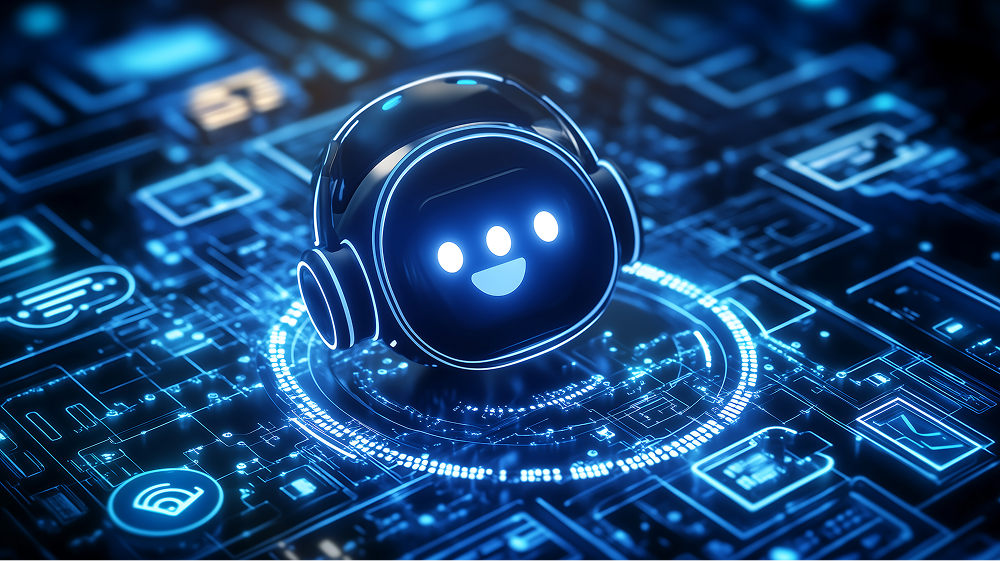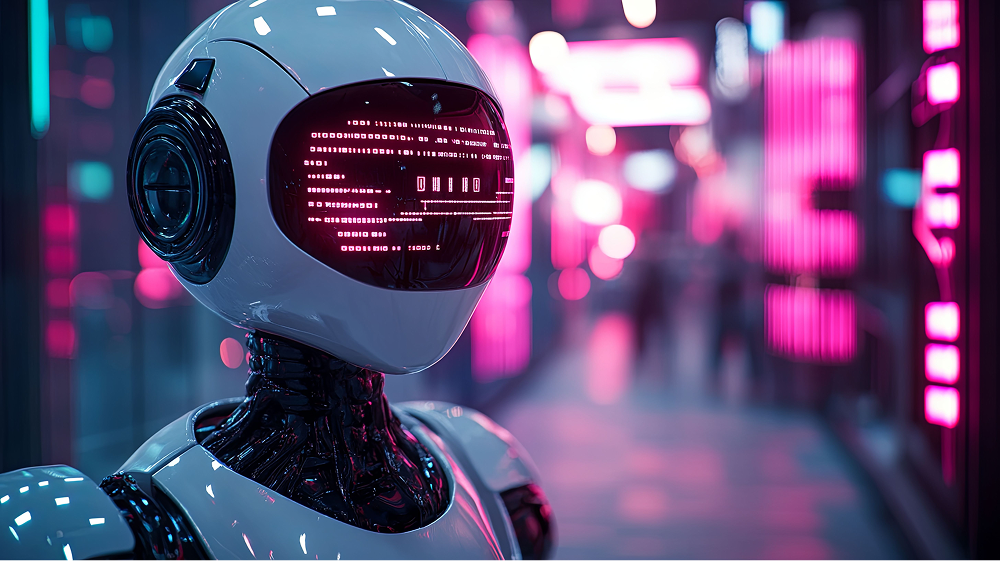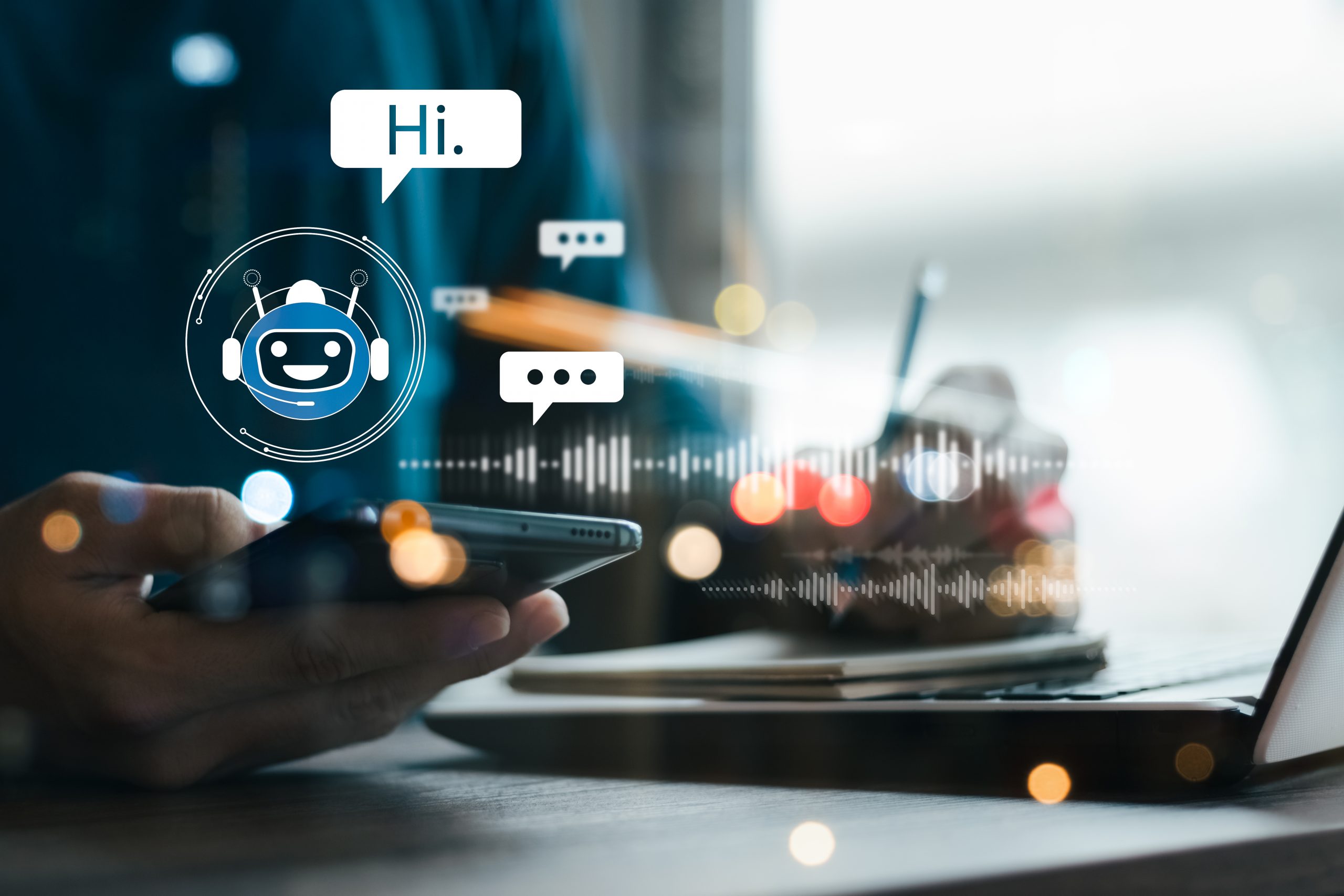Modern customers expect from business not only a quality product, but also an impeccable service. Quick response, round-the-clock availability, personalized approach and convenient self-service tools are becoming standard. That’s why an increasing number of companies are implementing artificial intelligence-based chatbots to support their customers.
Such solutions allow you to respond instantly to requests, reduce response time and increase user satisfaction. They integrate with corporate systems, work across various communication channels, and, if necessary, transfer complex issues to live agents for resolution. Thanks to scalability, cost-effectiveness, and flexible customization, AI chatbots have become an indispensable tool for businesses that strive for high efficiency and customer loyalty.
What Is a Customer Service Chatbot?
A customer service chatbot is a communication tool that typically operates based on artificial intelligence (AI) and helps automate support. He can conduct a dialogue with customers, answer questions and quickly solve simple problems.
During the service process, such bots recognise typical speech patterns of users at different stages of their interaction with the company. This enables them to understand the client’s intentions and provide relevant answers, while freeing up live operators to focus on more complex requests.
There are two main types of chatbots: rule-based and AI bots. The first ones work according to predefined scenarios and are ideal for quick answers to frequently asked questions. The second approach utilizes NLP and machine learning to understand the context, learn from previous dialogues and imitate live communication, which makes them effective for solving complex problems.
Why Are Customer Service Chatbots So Popular?
The popularity of chatbots is skyrocketing due to the combination of ease of implementation, cost-effectiveness and modern technologies.
Ease of implementation. Today, you can implement a chatbot in just one day, using ready-made platforms and designers – even without deep programming skills. This makes the solution accessible to both startups and large companies.
Cost-effectiveness. Up to 75% of client requests can be processed by a bot, which reduces the burden on employees and allows the business to scale support without increasing the staff.
Modern technologies. Previously, chatbots were limited to simple scripts, but today they work based on AI and LLM models. Thanks to the development of algorithms, processors, and big data, they can understand natural language, answer a wide range of questions, and even perform entire business processes.

Chatbot vs. Live Chat Explained
In modern business, customers expect not only a high-quality product but also fast, convenient, and personalized service. Fast responses, 24/7 availability and self-service are becoming the standard. In this regard, companies often face the choice between chatbots and live chat. Both solutions have their strengths and weaknesses, so it is essential to understand which option best aligns with the objectives of your business.
Chatbot
Pros: 24/7 availability, instant answers to standard questions, resource savings and high scalability. Modern AI bots can integrate with corporate systems, operate across various communication channels, engage in complex communication scenarios, and, if necessary, transfer the client to a live operator.
Cons: limited understanding of non-standard or emotionally complex requests, lack of human empathy, the need for regular updating and training for AI bots.
Live chat
Pros: personalised interaction, the ability to cope with emotionally complex situations, and increased customer confidence. The human operator can respond flexibly to unusual requests and adapt the style of communication to each client.
Cons: requires more personnel costs, available only during business hours, processing of mass requests is slower.
The best solution for most companies is a combination of chatbot and live chat. The bot handles routine and frequently repeated tasks, provides instant answers and round-the-clock support, and the operator intervenes only in complex or non-standard situations. This approach reduces the burden on staff, reduces waiting time and increases customer satisfaction.
A competent combination of AI technologies and the human factor creates an effective and flexible customer support system. It not only provides round-the-clock interaction, but also helps to form a positive brand image, increasing customer loyalty and trust. In modern times, when customer expectations are continually evolving, this approach becomes a crucial competitive advantage.
What Are the 4 Types of Chatbots?
Modern companies are increasingly using chatbots to improve customer service, reduce response time and improve efficiency. There are four primary types of chatbots, each suited for specific tasks.
Voice chatbots
Voice bots use speech recognition to interact with users. They are especially useful where it is inconvenient to type, for example, on a smartphone while driving or when managing a smart home. Examples of such technologies are Amazon Alexa and Apple Siri. Voice bots help users get information and support without the need for typing, which improves the convenience and speed of service.
Hybrid chatbots
Hybrid solutions combine rules and AI. Simple questions are processed according to predetermined scenarios, and more complex ones are processed through artificial intelligence. This allows you to quickly solve standard tasks and effectively process non-standard requests at the same time. Hybrid chatbots are becoming a universal tool for companies that care about combining speed and quality of service.
AI-powered chatbots
Bots with artificial intelligence analyse the context, understand complex requests and learn from interactions with users. They are able to give personalized answers and adapt to new situations, which makes them ideal for complex customer service. Such chatbots can solve a wide range of issues, provide recommendations and improve the customer experience by learning from real data.
Rule-based chatbots
These bots work according to predefined scenarios, like a flowchart. They do not utilize artificial intelligence and are strictly accountable for adhering to established rules. Such chatbots perfectly cope with simple tasks: provide information about orders, answer frequently asked questions or help with basic operations in the account. Thanks to their predictability, they provide stable and accurate answers, which is especially important for routine queries.
The use of different types of chatbots allows companies to optimize communication, reduce the burden on employees and increase customer satisfaction. Such solutions are implemented in call centres, online stores and support services, making the service more modern and accessible.
How Does a Customer Service Chatbot Work?
Chatbots for customer service have become an essential part of modern business. They help companies respond quickly to customer requests, save employees’ time and improve the quality of service. But how exactly do these bots understand people and answer their questions?
The basis of the work of such chatbots is natural language processing (NLP). NLP allows a computer to understand and analyse human language. With the help of syntax analysis, the bot checks how much words and sentences correspond to the grammar. This includes dividing the text into separate words and phrases (tokenization), defining parts of speech, and analyzing the sentence structure.
In addition to syntax, semantics and pragmatics play crucial roles. Semantics helps the bot understand the meaning of phrases, for example, that the phrase “I have a problem” indicates the client has encountered difficulties and needs assistance. Pragmatics enables you to consider the context. For example, if the client says “I think that…”, the bot realizes that the person is not sure and is looking for confirmation or advice, rather than just sharing the fact.
The basis of such bots is also artificial intelligence (AI) – technologies that enable machines to imitate human thinking. AI makes it possible not only to understand the text, but also to make decisions, learn from experience and adapt to new situations.
A key part of AI is Machine Learning (ML). It allows bots to analyse data, identify patterns and improve their answers over time. There are different types of training:
- With training under the guidance of a teacher, the bot learns from marked data with known answers.
- Without a teacher, the system itself searches for patterns in unlabelled data.
- With reinforcement, the bot tries different actions and chooses the best ones, based on the received “reward”.
- Deep learning utilizes multilayer neural networks to analyze complex information, including images, sound, and natural language.
The customer service chatbot combines language processing, artificial intelligence and machine learning. This enables him to understand the meaning of requests, consider the context, offer solutions, and continually refine his approach. As a result, the client receives a prompt and accurate response, and the company provides adequate support without overburdening its employees.

What Are The Advantages For Users
The use of AI chatbots offers customers numerous advantages, making interaction with the company faster, more convenient, and more effective. Below are the main advantages for AI chatbot users:
Reduced Wait Times
Thanks to AI chatbots, users can significantly reduce the waiting time. Instead of waiting for a response from a live operator, customers receive instant answers to their questions. This is especially important when solving urgent problems or searching for information online. Reducing the waiting time increases overall satisfaction and makes the interaction process more comfortable.
Reliable Information
Intelligent virtual assistants provide reliable information using knowledge bases, FAQs and specially trained AI algorithms. Customers can be assured that the answers they receive are accurate and relevant. The reliability of information reduces the risk of errors, helps to solve problems faster and improves trust in the company.
24/7 Assistance
AI chatbots are available 24/7, providing continuous customer support. Users can request help at any time, regardless of the time zone or the company’s work schedule. This is especially important for international customers and people with non-standard working hours. Round-the-clock support makes the service affordable and reliable.
Customised Experience
Modern chatbots provide a personalized experience for each user. They can take into account the history of interactions, preferences and previous requests, offering individual recommendations and solutions. A personalized approach creates a sense of care for the client and strengthens his trust in the brand.
Multilingual Support
Multilingual support allows you to serve customers all over the world. Users can communicate in their native language, which makes interaction more convenient and understandable. This expands the audience and increases customer loyalty in different countries.
All these advantages make AI chatbots a powerful tool for improving customer experience. They reduce waiting time, provide accurate answers, provide round-the-clock support, create a personalized experience and allow you to communicate in the user’s native language. Thanks to this, customers get convenient, fast and effective interaction with the company, and brands strengthen the trust and loyalty of their users.
What Are the Benefits of AI Chatbots for Businesses?
Modern business faces growing customer requirements: instant responses, personalised service and round-the-clock support. In such conditions, AI chatbots become an indispensable tool for companies of any size. They help not only to improve the quality of service, but also to optimize internal processes, reducing the burden on employees.
Automated Efficiency
AI chat bots allow you to perform routine tasks automatically – from answering typical questions to processing orders. This frees up employees to solve more complex tasks, speeds up the processing of requests and increases the overall productivity of the team.
Smooth Integrations
Modern bots are easily integrated with CRM systems, internal databases and other company tools. This integration provides a single flow of information, minimises errors and makes customer service more coherent and efficient.
Flexible Customisation
Chatbots can be customized to the specific needs of the company and customers. They take into account the history of interactions, user preferences and provide individual recommendations, creating a sense of personal approach and increasing customer loyalty.
Ongoing Enhancement
Thanks to machine learning and data analysis, chatbots become smarter over time. They learn from past interactions, increasing the accuracy of responses and improving the quality of service, which makes the customer experience smoother and more enjoyable.
Lowering Expenses
AI chatbots can significantly reduce customer support costs. They are able to process many requests at the same time without increasing staff, reducing operating costs and increasing business profitability.
As a result, AI chatbots not only enhance service and speed but also enable businesses to grow, optimize processes and strengthen customer ties, while remaining competitive in today’s market.

What Challenges Do Businesses Encounter When Implementing AI Chatbots for Customer Support
Complex Queries
Even though chatbots do an excellent job with routine tasks, they cannot always correctly process complex, non-standard, or emotionally coloured customer requests. This requires additional mechanisms – for example, automatic forwarding of such appeals to live specialists.
Safety
Any digital system is vulnerable to cyberattacks, and chatbots are no exception. Companies must implement modern security methods to prevent unauthorized access and reduce the risk of technical failures. This includes the use of encryption, multi-level authentication, regular system monitoring and software updates.
Confidentiality
AI chatbots work with users’ personal data, so it is essential to ensure their reliable storage and processing. Failure to comply with confidentiality rules can lead to legal consequences and loss of customer confidence. Companies must comply with the requirements of data protection legislation, restrict access to information and use transparency policies so that users understand exactly how their data is used.
Integration
Chatbots should integrate seamlessly with the company’s existing systems, including CRM, databases, and internal platforms. The connection must be trouble-free and as convenient as possible for employees. Integration errors can slow down processes, make it difficult to perform tasks and reduce the overall effectiveness of implementation.
Ethical Control
It is essential to ensure that chatbots utilize data accurately and do not facilitate discrimination or biased decisions. Compliance with ethical standards enhances customer confidence and mitigates reputational risks, demonstrating the company’s responsible approach to technology
The implementation of AI chatbots requires a well-thought-out approach: a combination of technologies, data protection and attention to customers.With proper integration, they become not just an automation tool, but a competitive advantage that allows businesses to improve efficiency and strengthen user confidence.
Real-World Examples of AI Chatbot Apps in Customer Support
AI chatbots are actively implemented in various areas, helping companies save resources and provide customers with a more convenient service. Here are some illustrative examples.
- E-commerce. Online stores use chatbots for personalized recommendations, instant answers about delivery, returns and availability of goods. Bots can offer similar products, remind users about abandoned shopping carts, or even place orders directly within the chat.
- Banking and Finance. Bank chatbots answer questions about balances, transactions, tariffs, and help customers manage their finances. Some bots offer individual advice on savings and investments, which increases the trust and intangibility of users.
- Healthcare. In medicine, chatbots analyze symptoms, help with scheduling a doctor’s appointment, and remind you to take medication. For patients, this is a convenient way to obtain an initial consultation 24/7, and for clinics, it reduces staff workload.
- Travelling. Travel companies implement chatbots for booking tickets, hotels and car rentals. They also provide recommendations on routes, select tours and answer frequently asked questions, simplifying the trip planning process.
- Smart home. In “smart homes”, chatbots are integrated with lighting, climate and security control systems. The user can turn on the light or adjust the temperature with a simple message or voice command.
- Entertainment. In the entertainment industry, chatbots help you search for movies, music or games based on your preferences. Some platforms implement interactive communication scenarios, making interaction an integral part of the gaming experience.
These examples show that chatbots are becoming a universal tool that improves the quality of service and makes interaction with companies as convenient as possible.
What Factors Should You Consider When Choosing AI for Customer Support?
When choosing an AI chatbot or automation tool, it is important to take into account a number of factors that directly affect its efficiency and business benefits. Below are the key aspects that warrant attention.
Comprehension of Natural Language
The chatbot must have a developed ability to process natural language (NLP). This allows him to recognise the meaning of phrases correctly, take into account the context and even the user’s emotions. The higher the level of understanding, the more natural and human the dialogue will be.
Data Analysis
Modern chatbots can not only respond to requests, but also collect, analyse and structure data. Such functionality helps businesses identify patterns, assess customer needs and make more informed decisions.
Automated Processes
AI solutions allow employees to be freed from routine tasks. Automation of request processing, ordering or providing reference information speeds up service and reduces the burden on staff.
System Integration (Integration with systems)
An effective chatbot should be easily integrated with existing business systems, such as CRM, helpdesk, e-commerce, and other tools. This provides a single information space and allows you to establish uninterrupted data exchange.
Artificial Intelligence Models
The key advantage of advanced chatbots is the use of AI models and machine learning algorithms. They allow the bot to adapt to new scenarios, improve with experience and provide more personalised answers.
When choosing a chatbot, it is worth evaluating its ability to understand the language, work with data, automate processes, integrate with systems and use modern AI models. This approach will enable the implementation of a solution that benefits both the business and its customers.

Steps for AI Chatbots Integration
Integrating an AI chatbot into the site does not have to be difficult. The main thing is to break down the process into understandable stages. With the right approach, the chatbot turns from a separate tool into a full-fledged assistant that answers questions, helps users and connects with the systems that your team already uses.
Here are 5 steps to help you successfully implement an AI chatbot and use it for business tasks:
1. Define goals and scope
Before choosing a platform, decide what exactly you want to achieve: reduce waiting times, increase the number of leads or speed up purchases. Set success metrics in advance, such as the average decision time or the proportion of automated responses. This will simplify further evaluation.
2. Choose the right platform
Look for a solution that integrates with your current systems: CRM, help desk, e-commerce. Useful features such as open API and simple customisation without code. This will allow you to run the chatbot faster even without deep technical knowledge.
3. Connect your data sources
The effectiveness of a chatbot depends on the information it has access to. Integrate it with the knowledge base, internal documents, delivery policy and other materials. This will provide accurate and up-to-date answers, reducing the number of errors.
4. Test and iterate
Test the chatbot in real scenarios. Follow the points where he is “lost” or does not understand the context. Use feedback and add new Q&A to the knowledge base. This will help to hone the quality to the official launch.
5. Launch and monitor (Launch and monitor)
You shouldn’t run a chatbot across all channels simultaneously. Start with one page or a specific case, and then expand the use. Regularly monitor KPIs: customer satisfaction level, percentage of successfully resolved requests and number of requests redirected to a person.
Thus, step-by-step integration helps avoid overloading and allows for gradual scaling of automation without losing control.
What Data Types Can Train AI Chatbot Apps for Customer Support?
For practical AI training, it is vital to utilize a diverse range of data types. This can be the content of your site, articles from the knowledge base, custom text inputs, frequently asked questions (FAQ), as well as documents in PDF and Word formats. Such a wide range of sources allows the AI model to understand better the specifics of the business and the tasks of users.
In addition, data can be both structured and unstructured, ranging from tables and databases to texts, images, or transcripts. The data must be of high quality, relevant, and correctly marked, as this directly affects the accuracy and efficiency of AI.
Using different sources of information, you can create an AI system that provides personalised answers, handles complex questions, and adapts to real-life scenarios of customer interaction. This approach helps to increase the efficiency of chatbots and other AI tools in working with users.
The Future of AI Chatbots in Customer Support
The future of AI chatbots in customer support looks very promising. Modern artificial intelligence technologies allow chatbots to become more intelligent and effective in processing customer requests. They are able to understand complex questions, quickly provide accurate answers and personalise interaction, taking into account the preferences and behaviour of users.
One of the key areas of development is emotional intelligence. Chatbots learn to recognise the mood and emotions of customers, which makes communication more natural and human. Modern natural language processing algorithms allow them to understand complex queries and take into account the context, reducing the need for constant human intervention.
Another aspect is integration with other AI tools, such as predictive analytics and machine learning. This enables companies to anticipate customer needs in advance, offer solutions proactively and improve the quality of service.
The development of AI chatbots opens up new business opportunities, increasing support efficiency, reducing costs, and improving the customer experience. Companies that actively implement such technologies will be able to provide fast, personalised, and convenient service while remaining competitive in the market.

Trends and Technologies Shaping the Next Generation of AI Chatbots
Emerging trends and technologies shape the next generation of AI chatbots, increasing their functionality and capabilities. Ongoing advances in machine learning algorithms allow chatbots to learn and adapt in real time, improving accuracy and efficiency. Below are the key trends that are worth paying attention to:
Machine Learning
Ongoing advancements in machine learning algorithms will enable chatbots to learn and adapt in real-time, improving their performance and accuracy. They analyze data and past interactions to provide more precise and personalized responses, making conversations more natural and effective.
Contextual Understanding
Chatbots of the future will better understand the context of user messages. Thanks to improved natural language processing models, they will be able to recognise nuances, idioms and emotional shades, providing more meaningful and accurate answers.
Dialogue-based AI
Dialogue models of artificial intelligence will allow chatbots to conduct full-fledged conversations, and not just respond to individual requests. They will be able to support complex communication scenarios, solve problems and adapt to the user’s communication style.
Multiple Languages
Multilingual support is becoming the standard. The new generation of chatbots will be able to communicate with users in different languages, maintaining the accuracy and naturalness of the dialogue, which is especially important for global companies.
AI Technologies Compatibility
Integration with other AI technologies, such as voice recognition and emotional state analysis, enhances the versatility of chatbots. They will be able to interact through voice interfaces, adjust to the client’s mood and provide quality service on different platforms.
These technologies create a future in which AI chatbots will become key tools for personalised and effective interaction with customers.
Conclusion
AI chatbots revolutionize customer support, providing personalized interactions and effective problem-solving. The evolution from simple bots to advanced AI solutions was impressive. Choosing the right chatbot to meet the needs of your business is crucial. Training and integration are important for achieving optimal performance. Despite challenges such as privacy issues, AI chatbots improve customer service by providing real-time solutions.
In the future, trends such as machine learning will shape the development of AI chatbots. By analysing feedback and key performance indicators (KPI), you can assess their impact and return on investment. The use of this technology provides a seamless customer support experience in the digital age.If you want to improve customer support with AI chatbots, we are ready to help. Our team creates, implements and configures chatbots for your business. From strategy and automation to language processing customisation (NLP) and system integration, we make sure that your chatbot brings real results. Contact us to start creating smarter, faster and more natural customer support today.timizing AI-driven chatbots tailored to your business goals. From strategy and automation to NLP tuning and backend integration, we ensure your chatbot delivers real results. Get in touch to start building smarter, faster, and more human-like customer service today.




